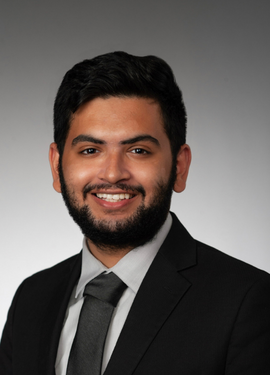As a certified EMT, Amaar Asif works twelve-hour shifts transporting patients to and from the hospital. He’s noticed, however, that a ten-minute ride can cost $2000; a price that he can hardly imagine elderly patients paying. As a prospective emergency room physician, Amaar plans to advocate for change that prevents costs like those.
Amaar started the MS in Health Policy and Economics program at Weill Cornell Medicine (WCM) in September 2022. He’s a part-time student aiming to graduate in 2024, and then attend medical school. Though his goals are adaptive to circumstances like the pandemic, he’s always planned to enter healthcare.
Before Amaar was born, his grandfather suffered an accident at work that paralyzed him from the waist down. Having lived near to his grandfather his entire life, Amaar and his family members—including his mom and two sisters—have always taken care of each other. He calls his grandfather his number one support system, who pushes him to accomplish things he never thought possible.
“What happened with my grandfather was definitely the motivating factor for me to get into healthcare. I’ve seen him deal with chronic pain, neuropathic pain, pain management problems, and the fact that his brain was never able to acknowledge that the nerves in his legs don’t work anymore. That was a life-changing experience, but the lesson that it taught me was to be an advocate,” he said.
Though Amaar’s motivation to enter healthcare began at home, experiences throughout his academic career have furthered that motivation. While obtaining his BA in neuroscience and biology at Syracuse University, Amaar took a class on healthcare policy that prompted him to better understand healthcare at large before becoming a physician himself. In a subsequent and unexpectedly transformative experience, Amaar was able to shadow an emergency room physician and become a patient care technician at St. Joseph’s Hospital Health Center.
“I was literally on the front lines of the pandemic in the COVID unit,” he said. “I was working as a patient care technician from 7 p.m. to 7 a.m., and at 9 a.m., I would have my biochemistry lecture. I enjoyed what I was doing, and I figured if I could stand on my feet for twelve hours, then this [career] might be it.”
As a part-time student in the HPE program, Amaar’s taken Introduction to US Healthcare Policy & Delivery (HPEC 5001) with Dr. Arian Jung, associate professor of population health sciences, and Introduction to Biostatistics with Stata Lab, taught by Dr. Arindam Roy Choudhury, associate professor of population health sciences. In Dr. Jung’s class, he’s been able to listen to new speakers each week and understand how healthcare is approached around the world. Similarly, in Dr. Choudhury’s course, he’s gained perspective on how data can be used to simplify tasks.
“The master's program is way more individualized than it was in my undergrad experience,” he said. “Here, I feel like professors know who I am, and I didn’t have to go out of my way for that—they wanted to know who I was. Everyone’s really trying to support you.”
Amaar highlights that Dr. Jung’s class has confirmed to him that he’s in the right place, and alerted him to issues he never knew were affecting the healthcare system. Whether he’s working on a project on the healthcare system in Singapore or listening to speakers share the barriers to healthcare for immigrant populations, the course has made him confident about furthering his career in healthcare. He explains that his professors have collectively encouraged students to set their goals from day one, and are eager to help students in realizing those goals.
“It’s been great experiencing the small class environment, the accessibility of professors outside of class, and the investment on what I want to do outside of this program from the faculty. I’ve never once had a fear of asking questions, or being vocal about not understanding a concept,” he said. He also appreciates the diversity of backgrounds the students have, and the range of ways they intend to use their degrees to help others.
Amaar’s schedule is full; he constantly transitions between his role as an EMT, his classes, his MCAT preparation, his commute between NYC and New Jersey, and his commitment to his family. Even when his routine shifts, his long-term goals are intact.
“I want to be there for patients in more ways than just giving them medication,” he said, “and to be advising on healthcare policy that impacts both the quality and quantity of care at a hospital. As a future physician, it’s important to understand the system from the ground up.”


